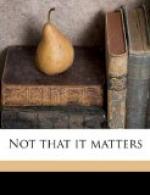I should like to believe in astrology, but I cannot. I should like to believe that the heavenly bodies sort themselves into certain positions in order that Zadkiel may be kept in touch with the future; the idea of a star whizzing a million miles out of its path by way of indicating a “sensational divorce case in high life” is extraordinarily massive. But, candidly, I do not believe the stars bother. What the stars are for, what they are like when you get there, I do not know; but a starry night would not be so beautiful if it were simply meant as a warning to some unpleasant financier that Kaffirs were going up. The ordinary man looks at the heavens and thinks what an insignificant atom he is beneath them; the believer in astrology looks up and realizes afresh his overwhelming importance. Perhaps, after all, I am glad I do not believe.
Life must be a very tricky thing for the superstitious. At dinner a night or two ago I happened to say that I had never been in danger of drowning. I am not sure now that it was true, but I still think that it was harmless. However, before I had time to elaborate my theme (whatever it was) I was peremptorily ordered to touch wood. I protested that both my feet were on the polished oak and both my elbows on the polished mahogany (one always knew that some good instinct inspired the pleasant habit of elbows on the table) and that anyhow I did not see the need. However, because one must not argue at dinner I tapped the table two or three times... and now I suppose I am immune. At the same time I should like to know exactly whom I have appeased.
For this must be the idea of the wood-touching superstition, that a malignant spirit dogs one’s conversational footsteps, listening eagerly for the complacent word. “I have never had the mumps,” you say airily. “Ha, ha!” says the spirit, “haven’t you? Just you wait till next Tuesday, my boy.” Unconsciously we are crediting Fate with our own human weaknesses. If a man standing on the edge of a pond said aloud, “I have never fallen into a pond in my life,” and we happened to be just behind him, the temptation to push him in would be irresistible. Irresistible, that is by us; but it is charitable to assume that Providence can control itself by now.
Of course, nobody really thinks that our good or evil spirits have any particular feeling about wood, that they like it stroked; nobody, I suppose, not even the most superstitious, really thinks that Fate is especially touchy in the matter of salt and ladders. Equally, of course, many people who throw spilt salt over their left shoulders are not superstitious in the least, and are only concerned to display that readiness in the face of any social emergency which is said to be the mark of good manners. But there are certainly many who feel that it is the part of a wise man to propitiate the unknown, to bend before the forces which work for harm; and they pay tribute to Fate by means of these little customs in the hope that they will secure in return an immunity from evil. The tribute is nominal, but it is an acknowledgment all the same.




